Pandemic Puppy Crew
I'll see your "dog that looks like its owner" and raise you one "dog that gets sick like its owner"
Hi all, it’s been a while. What have I missed? Anything good? Please, really, welcoming ANY good news.
The only almost-funny thing I’ve read recently - which is not funny at all, to be clear - is a profile in The Atlantic of Steve Witkoff, Trump’s golf buddy slash shadow secretary of state, a man who had a one-on-one meeting with Putin and returned to the White House with a Kremlin-commissioned portrait of Trump. The profile opens with Witkoff in his West Wing office, emptying his backpack of a jumble of electronic devices he uses to communicate abroad, in order to find and show off a special pager gifted from Netanyahu and the Mossad to commemorate the 2024 pager-bomb attacks against Hezbollah. He evidently has not considered the possibility of said pager containing, if not a bomb, at the very least, surveillance technology.
The back of the pager, he proudly told me, carries an inscription: Dear Steve, friend of the state of Israel. And then the acronym OTJ, for “One Tough Jew.”
I can’t help wondering: did Witkoff bring his pager to the meeting with Putin? To negotiate through an intermediary with Hamas? Espionage used to require some subterfuge! No more.
Anyway.
On an entirely different but (sorry!) also distressing front, my 2025 so far has been largely spent grappling with illness. Not just mine – my pets’, too.
Before anyone thinks “holy hell I can’t take a drawn out story where a beloved animal dies at the end” and clicks away – don’t worry, this isn’t that.
Actually. That’s a lie. I wrote that sentence without thinking, a sort of desperate instinct to keep things cheery, but the truth is this isn’t that story only because I can only handle writing at length about one beloved pet at a time right now, so I’m going to speed by the story involving death and devote most of this to the story with a more hopeful present.
My instinct is to reach for dark humor or ironic detachment to make this a more palatable read and temper the emotional intensity of the lived experience, which was: four months spent trying to deduce whether my dog had come down with an illness symptomatically similar to my Long Covid, or was sympathetically mirroring my symptoms, or had developed serious depression because of my sickness and was avoiding me because of it…and then suddenly, my 12-year-old cat, who I adopted as a kitten just after college, had a massive stroke and died.
The truth is: it’s been awful. The kind of awful that can’t be mitigated by highlighting the absurdity of the “my dog and I have matching illnesses?!” storyline. Screw good material. Honestly, I’m mainly writing about it now because I spent months scouring the internet for similar stories and coming up empty.
Maybe this isn’t a common experience - but if I’ve learned anything, it’s that every experience, at its emotional core, is more common than we, engulfed in the isolating moment, could ever imagine. And so: maybe this will find its way to someone sending out grammatically unhinged Google and /r/dogs search flares like I did, such as —
⁃ Dog sympathetic long covid?
⁃ Velcro dog avoiding me because sick and similar symptoms
⁃ dog avoidance while sick
⁃ velcro dog afraid of owner chronic illness
Meet Eloise
Eloise was my pandemic puppy – a foster fail in the summer of 2020 – and she has been my constant companion ever since, the most stable part of upheaval-filled years. She’s been by my side through two break ups, two cross-country moves, and six home moves. She just turned five.
There’s lots of talk about dogs resembling their owners. Physically, that’s not the case for us. Personality-wise…well, I wouldn’t necessarily have put it that way. That is, until the week that the dog trainer and my literary agent described each of us the exact same way.
Dog trainer: Eloise is a brilliant puppy who bores easily and needs constant challenges or she’ll start to behave destructively.
(I’d appealed for help after positive reinforcement training – which dictates that instead of saying “no” when a dog is chewing an inappropriate toy, you should redirect their attention to a higher-value toy—resulted in Eloise regularly nosing her way into my nightstand drawers and presenting me with items she knew were forbidden (e.g. my antidepressant bottle) to trade for something better.)
Literary agent: You’re like a brilliant puppy who needs to be constantly challenged or she’ll start destroying the house.
(I’d sent a late night photo of a color-coded post-it wall outline of the novel we’d already sold and which I was now considering restructuring.)
So…apple, tree, I guess.
As a puppy, Eloise’s separation anxiety was so severe that it required months of work with two different trainers to get to the point where she could tolerate me closing the bathroom door on her. Eloise is not food motivated or toy motivated. She is my-attention-motivated. She’d leave a hamburger on the floor if I left the room. She doesn’t like to eat a dog biscuit until we have played a game of fetch and retrieve with it several times. She does not like to play with toys on her own.
People often remark about how well-behaved she is – something I took for granted and often countered with, “You should see her at home!” At home where she would tap demandingly on the cabinets containing treats and occasionally threaten to unplug the television or prompt the printer to print test pages only to then tear them up. She knows that when I uncross my legs and flatten my lap, that’s her permission sign to jump up. She can sit on my lap at a table full of food and won’t try to reach for any of it. She has perfect recall, would come running from any distance at the softest sound of my voice.
Or had. Did. Knew.
I took all these things for granted. It honestly never occurred to me that I could lose that bond, that closeness.
Eloise stayed patiently by my side during multiple bouts of COVID over the past few years. When I got sick last fall, she seemed to intuitively understand my energy limitations, and she pulled back on requests for fetch and tug of war and walks.
Then, mid-December, after nearly three months of being housebound with long COVID, everything changed. One day, she yelped in pain when I barely touched her side. Immediately after, she began shying away from me. If I went to one room, she’d move to another, tail tucked between her legs. She didn’t attach onto another person instead – when either of my parents visited, she’d wag her tail and go on walks with them, but when they returned home, she’d retreat on her own.
I was certain she had an injury. Didn’t dogs isolate when sick or injured? Didn’t they try to hide their pain? Cue multiple trips to vets and animal hospitals. I wasn’t well enough to take her to the first two appointments, so my parents brought her. But when there, she didn’t yelp when they touched her side. The doctors couldn’t find anything wrong. One vet said maybe it was a bruise, maybe she had strained something. It’d get better on its own with time.
I called a trusted dog trainer. She agreed that there was something medically wrong. Encouraged another trip to the doctor. One of Eloise’s siblings, Vinny (yes, I am in touch with all five of her siblings—er, their parents—and yes our group chat is called Pandemic Puppy Crew, and yes it is wonderful) has Addison’s disease, I told the trainer. Was that genetic? The trainer thought she should get tested; some of Eloise’s symptoms – intense lethargy, weakness, some gastrointestinal symptoms, abdominal tenderness—lined up with Addison’s.
But her cortisol levels were normal.
Eloise’s symptoms also lined up with…mine.
The dog trainer knew dogs who developed limps to match their owners, and I found stories of similar online, but this seemed much more extreme.
Shortly after Eloise began sporadically yelping when her stomach was touched, I ended up in the ER with a serious bacterial infection that first manifested as….stomach pain.
After that, Eloise’s stomach tenderness went away for a bit. But her lethargy and self-isolation continued. As did mine.
In lieu of any medical diagnosis, the trainer encouraged me to treat this as a sympathetic illness—yet another manifestation of how closely attuned Eloise was to me. Maybe she was mirroring my symptoms. Maybe she was grieving, confused – I used to take her everywhere; now I went nowhere, only from my bed to my living room couch and back again. Maybe Eloise didn’t understand what her role was supposed to be with me anymore. The trainer encouraged me to get a leash just for inside and tether her to it – and me – throughout the day. Re-attachment training. Whereas once I’d worked to stop her from accompanying me to the bathroom, now I was forcing her to go with me.
A few weeks into this, the stomach yelping returned. I brought her to the vet, described the symptoms. The vet suggested it might be chronic Lyme disease. Had Eloise spent time outdoors on the East Coast?
Eloise frequented Central Park and Prospect Park…in 2022 and 2023. And she took monthly flea/tick medicine. The vet said a bite could remain latent for a long time, etc, etc. Wanted to do tests.
My heart sank. The symptoms of chronic Lyme – in people and pets – have a lot of overlap with ME/CFS and Long Covid.
It wasn’t Lyme.
Eloise and I were making some progress at home with the forced leash attachment. But it was limited. When not leashed, she continued to keep her distance. She would engage excitedly with me only when I got down on the floor to play or chased her around or took her on very brief walks, on the rare occasions that I was well enough for it. I felt increasingly at a loss – I couldn’t fool Eloise into thinking I wasn’t sick; dogs can smell chemical changes, increased heart rate. I couldn’t bear the thought that Eloise and I couldn’t be close again until and unless I was healthy again.
Then the yelping returned, along with a tightness on one side of her body, a stiffness in her gait. I did more research. I remembered that one of her other brothers, Taj, has IVDD – a disc disease common in small dogs. I learned that back pain can present as side pain, and that dogs are good at masking the pain in adrenalized situations like at the vet. I made an appointment with a neurologist. He confirmed my suspicion. IVDD. Prescribed gabapentin and prednisone and a month of strict crate rest.
I felt terrible that she’d been in physical pain for so long, but I was grateful for a treatment plan, and hopeful that once she healed, things would go back to normal between us.
This was a little over a month ago. Before the diagnosis, I had made a desperate, hopeful plan to travel to Thailand for a three week “Immunity and Resilience” retreat blending western and Traditional Chinese Medicine treatments. I didn’t expect this would cure my Long Covid, but I had hopes that three weeks of relaxation and a change of scenery and an anti-inflammatory diet might help at least a little, and who knows, maybe some of the new treatments would help. I felt badly about leaving Eloise, but I made plans for her to stay with her trainer, who had extensive experience rehabbing dogs from injuries and who, I knew, would do a better job enforcing strict crate rest than I could.
The trainer sent me regular updates from LA. Eloise was healing well; her personality was returning; she was getting back to herself. The neurologist follow up appointment went well. By the time I returned, she’d be ready to ease back into regular activity.
Meanwhile, in Thailand, the more treatments I tried, the worse I felt. I told the program director that I couldn’t handle many treatments per day, that I needed to slow down. She accommodated my request for pacing to an extent but also encouraged me to do certain treatments right away.
I did acupuncture. I did hourlong sessions in a hyperbaric oxygen chamber. I did something called ozone therapy, which involved my blood being drawn and then mixed with ozone gas in a glass cocktail shaker of sorts, after which – newly bright red and infused with extra oxygen molecules – it was dripped back into my bloodstream.
I felt worse and worse.
I’d desperately wanted to have faith in the Long Covid and chronic fatigue syndrome treatment success stories the functional medicine doctor and TCM practitioner and program director told me about. But my health was declining; I was definitively worse than I’d been when I left for Thailand. And when I reported this and was told “it’s normal to get worse before you get better,” the words landed with a gut-punch of revelation.
If I’ve learned one thing about ME/CFS and Post Exertional Malaise, it’s that you never get worse before you get better. That’s how the disease works. You get worse before you get worse. And once you get worse, it becomes harder and harder to return to your previous baseline. That’s why so many people who’ve had ME/CFS for years – and spent years being told by doctors to push through it and try graded exercise therapy and cognitive behavioral therapy – have ended up in increasingly severe states of illness.
Bed-bound in Thailand, I received an email with my most recent blood test results…which revealed that my numbers on multiple fronts were worse than they were when I first came down with Long Covid, before I started trying to treat it with all different medicines.
A quiet voice in my head got louder: STOP. Stop trying new medicines that cause new side effects and create problems that weren’t there before. Stop putting your body through so much.
My body came down with a post-viral illness because it was overburdened. My immune system hit a breaking point; my autonomic nervous system went haywire. I’d been searching for a silver bullet – but science has no silver bullet for these illnesses yet. We only have off-label medicines intended to alleviate some symptoms.
Instead of simply accepting my body’s cry for rest and hoping that eliminating physical and emotional stress on my body would allow it to regain enough functionality to do the magical thing bodies can do – fight lingering viruses, heal from sickness – I kept throwing new medicines at it, with the encouragement of a doctor who literally referred to the treatment process as “throwing spaghetti on the wall.”
But this spaghetti was on fire. The wall? Doused in gasoline.
I began searching for stories of people who recovered from ME/CFS and ME/CFS and POTS-type Long Covid. These stories are harder to find because once people get better, they tend to stop posting on Reddit forums, for example. But the recovery stories were there, and most of them had a lot in common. Rest, patience, pacing. Gradually, gradually increasing activity. Eliminating stress. Doing less, not more. Acceptance, not effort.
I’d read accounts to this effect before, but they didn’t quite land until then.
I spent my last two weeks in Thailand doing very few treatments and lots of meditation and freeing myself from guilt about not “taking advantage” of all the special medical offerings being pushed my way. I regained some energy, little by little. I felt myself inching around a corner.
I received a report that Eloise was done with her course of medicine and crate rest and ready to ease back into activity. That the difference in her personality was night and day.
I couldn’t wait to see her.
Also: I was terrified to return home. I was feeling a little better, yes, but my blood tests said otherwise, and I had follow up appointments to make and not enough energy to live a significantly different life yet. It was one thing to find calm in a beautiful place with healthy food and ocean views and daily housekeeping. It was another thing to hold onto it when returning to the place I associate most with my sickness and isolation.
Also: what if Eloise came home and our bond was still broken? What then?
Returning Home
Earlier this week, Eloise and I had an exuberant, thrilling reunion in the front yard. She raced happily into the house, darted around to check on things, was delighted to play a few rounds of fetch with a chewy treat. Tail wags all around! We were back!
…And then I sat down on the couch.
Just like that, a switch flipped. Tail between legs, she cowered away from me. Lay down dejectedly. Wouldn’t accept a treat.
The trainer had texted saying how much Eloise loved to cuddle on the couch with her.
I lifted Eloise up onto the couch next to me. She immediately jumped down.
When I stood up, her tail started wagging again. I went into a different room, thinking: Maybe she associates the living room couch with me being sick. I certainly do. Maybe it triggered bad memories. Maybe I’m anthropomorphizing. I sat down in a different chair. She retreated further. I walked into my bedroom. She wouldn’t come through the door.
I felt something break inside me.
I texted the trainer in a panic. She told me this could be habitual behavior, lingering memories. That it wasn’t an aversion to me or my sickness.
That, like me, she has deep-seated painful associations with this house.
Which is easy enough to believe. This is a dog who for months was terrified of walking on the block of the Tailwaggers I had the audacity to take her to for a single grooming appointment. Who cowered when we approached a vet clinic she hadn’t been to in two years.
And, what’s more: I have painful associations with this house. With this couch. With my bed. I moved in just a few months before I got sick. My predominant associations with this space, beautiful though it is and grateful as I am to live in it, involve sickness and isolation and incapacity - an inability to use its rooms for the activities I’d imagined.
Now I need to break those associations for both my dog and myself – all the while still grappling with my illness and its limitations.
The trainer encouraged me to do the indoor leashing training again. It’s been a few days, and we’re making some progress. Her first night home, I had to force her up onto my bed at night, but when I pulled back the covers, she immediately crawled up to my side. I rubbed her back, and she put a paw out on my chest every time I stopped petting her.
I wish I could say that a magic switch was flipped in that moment and we’re all better now. It wasn’t, and we’re not. We’re working on it. But I’m also trying not to work too hard for the sake of my own healing, which presents a certain problem. See me pushing myself to play harder and walk further than I should to prove to my dog that I’m not sick anymore.
Still: right now, I am lying on the couch, typing on my laptop, and Eloise is sleeping with her head against a pillow at the other end of the couch. And in this moment, we’re okay.
(But if anyone reading this has gone through anything similar and has advice to share…I’m all ears!)


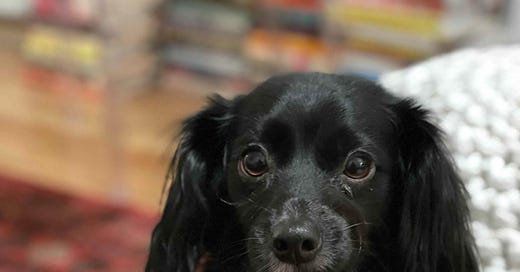



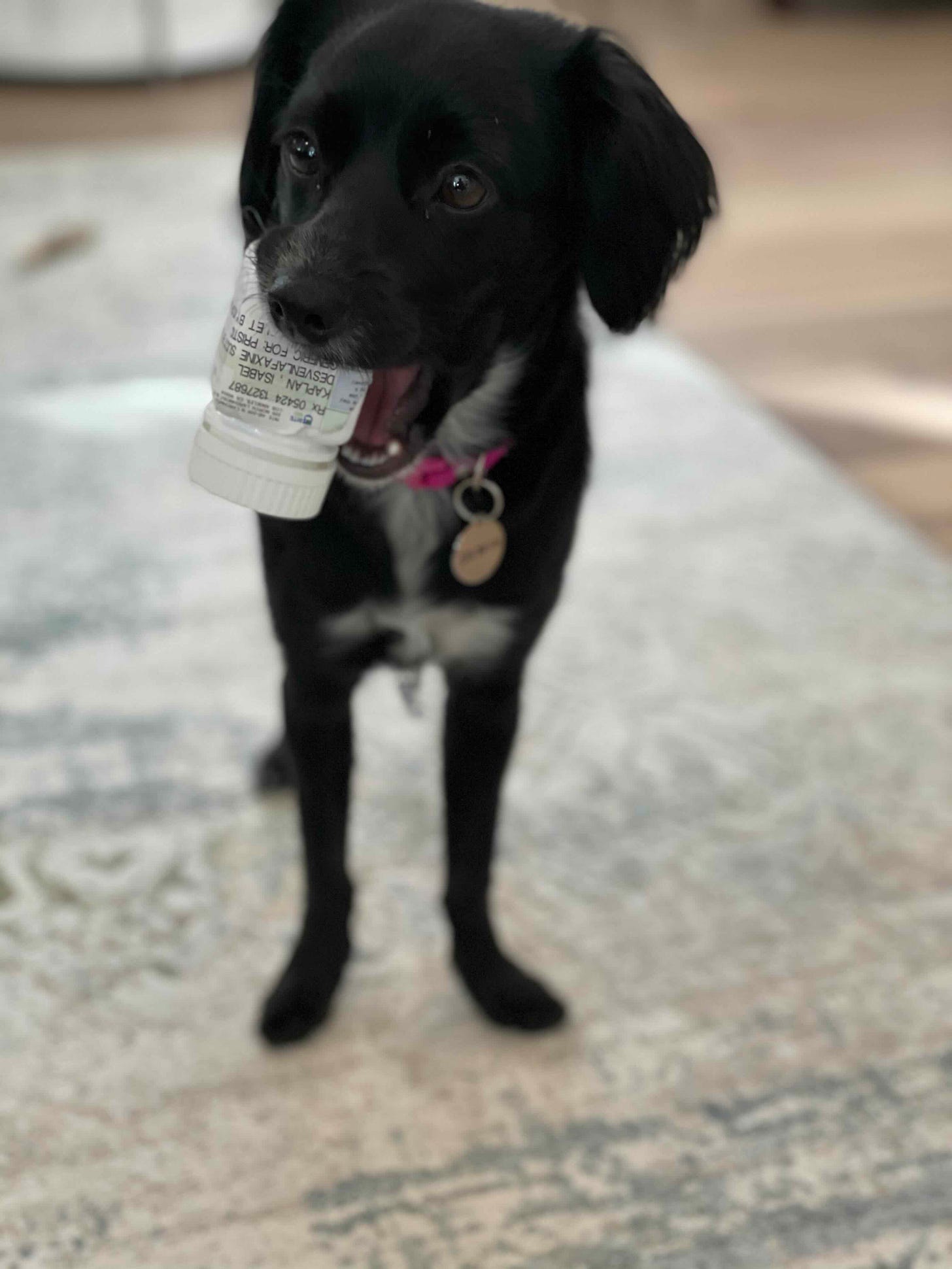
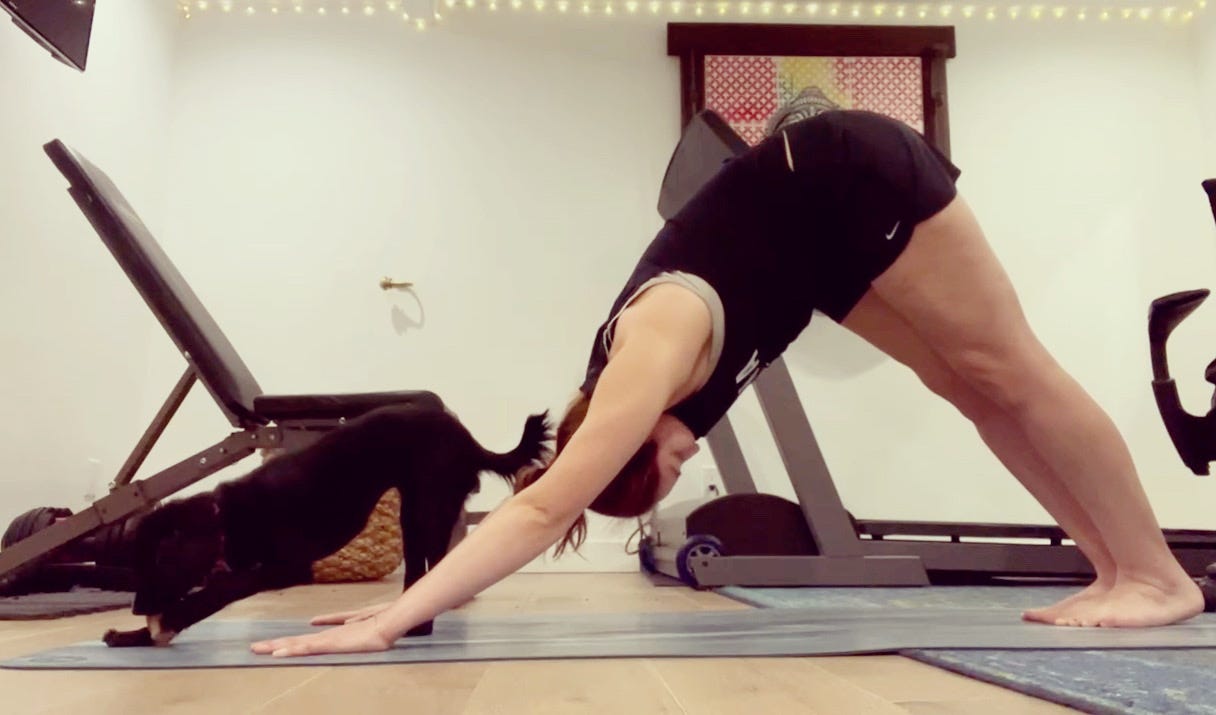
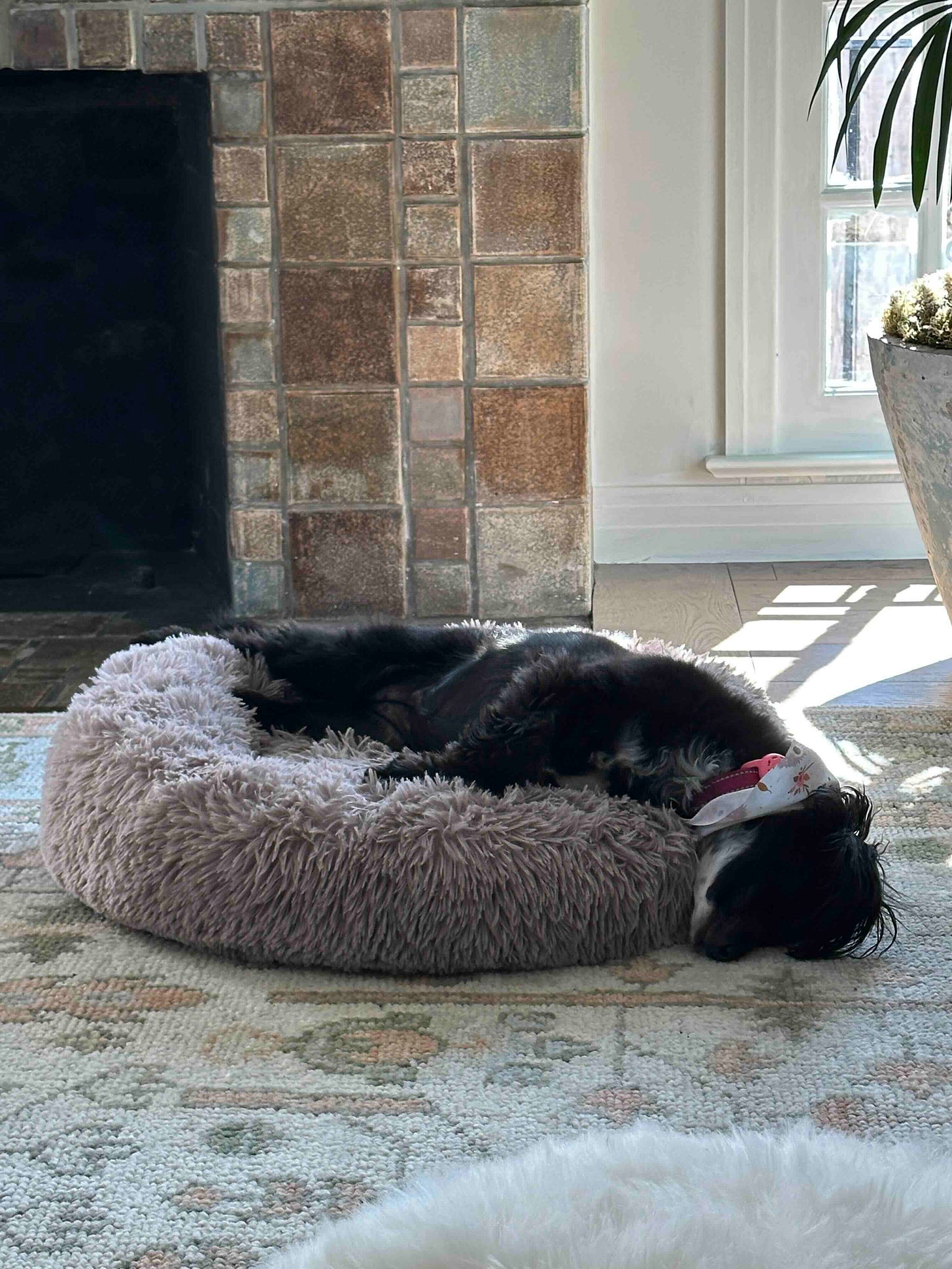
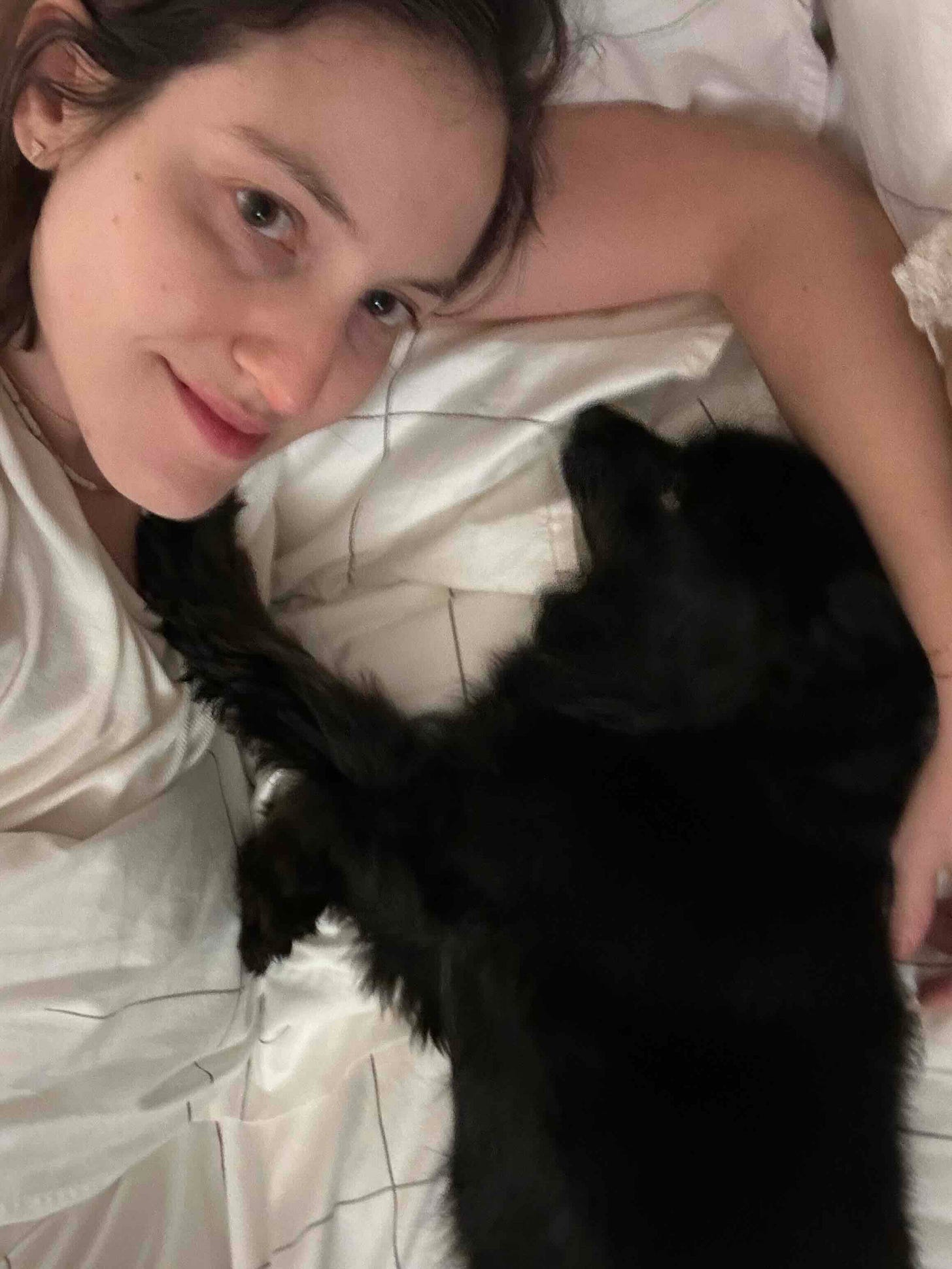
I’m rooting hard for both you and Eloise, Isabel. What you’ve been going through is brutal. I have a dog who’s always by my side too, and if he began acting the way Eloise did I’d freak the fuck out. I’m glad you were able to get a diagnosis for her, and I’m sorry that Thailand didn’t bring you any relief. I hope the bond between you and Eloise returns in full force. Thanks for continuing to write.
👋🏽 hello fellow sars2 disease sufferer. Did you know that people with sars2 disease are more despondent than people with cancer? There are no treatments for sars2 disease, only symptom management. There are millions of us, and millions more suffering with health problems that can’t be diagnosed.
We lost 2 of our beloved dogs last fall. One was a foster fail from 2011. A full of personality and bravado 7 lb Pomeranian. And the other was our most demanding cavalier in 20 yrs. She was only 9. I kept taking her to the vet saying that she wasn’t herself. It was advanced cancer. I blame sars2. All of our (3) dogs had it at least once.
We rescued a puppy mill puppy to replace the 2 beloved dogs we lost. The puppy mill puppy is a cavapoo and is too too smart. Fortunately, we have another cavalier (the 9 year old dog’s daughter). The puppy LOVES the cavalier and has severe separation anxiety if you even pick up the cavalier. The cavalier rarely leaves my presence, so the now 1 year old puppy is also always in my presence. She has separation anxiety with my son and with me. But as I have sars2 disease, I am usually home.
I know that when we have lost pets over the years, the surviving pets miss and grieve their companions. Could Eloise be lonely? Missing your cat? Could Eloise need a buddy?
We have had 2- 3 dogs for decades. Cavaliers need a friend with 4 legs. Even our mutt does.
Our puppy, is also a rascal. She will grab socks and take them out in the yard. When she is bored, she will tear up the latest amazon box. She is a finicky eater. Cavaliers will eat anything and act as if they have never beed fed, 24 hrs a day. But poodles, well, they are poodles, aren’t they? Even cooked hamburger has to be warm and not cold from the fridge.
I am getting divorced from my narcissistic abusive spouse of 20+ years. Once I got sick, the abuse became much worse. I realized that my spouse only valued my income, not me. We have savings and a house to divide. My spouse thinks that everything is his, even though I contributed financially as much as he did during our marriage. I am trapped in the house with him until our divorce is decided. Thank goodness for the 2 dogs. They sleep in the office on a twin mattress with me. They follow me from room to room. They are my shadows.
Regarding long covid recovery- there is a long covid recovered community on reddit. Mayo also has a long covid online community.
I am better than I was in 2023. With all of the symptoms- for me, the brain damage is the worst.
I appreciate your essays.
Thank you